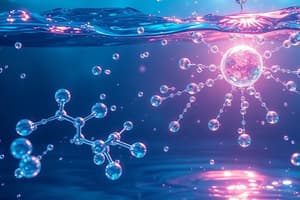Podcast
Questions and Answers
What type of bond forms between hydrogen and oxygen in a water molecule?
What type of bond forms between hydrogen and oxygen in a water molecule?
polar covalent bond
What property of water is responsible for its ability to form hydrogen bonds?
What property of water is responsible for its ability to form hydrogen bonds?
- Its polar nature (correct)
- Its high viscosity
- Its high boiling point
- Its low density
How many hydrogen bonds can each water molecule form?
How many hydrogen bonds can each water molecule form?
four
Water expands when it freezes.
Water expands when it freezes.
What term describes the phenomenon of water molecules being attracted to one another?
What term describes the phenomenon of water molecules being attracted to one another?
What role does adhesion play in water transport in plants?
What role does adhesion play in water transport in plants?
Why does water have a greater surface tension than most other liquids?
Why does water have a greater surface tension than most other liquids?
What is the specific heat of a substance?
What is the specific heat of a substance?
Water is most dense at 0°C.
Water is most dense at 0°C.
Which of the following describes a hydrophilic substance?
Which of the following describes a hydrophilic substance?
Flashcards are hidden until you start studying
Study Notes
Polarity of Water
- Water molecules are polar, with an oxygen atom having a partial negative charge and two hydrogen atoms with partial positive charges.
- The polarity arises from the electronegativity difference between oxygen and hydrogen, leading to uneven electron sharing.
- Polarity enables water molecules to form hydrogen bonds with each other, giving water unique properties.
Hydrogen Bonds
- Hydrogen bonds form between the slightly negative oxygen atom of one water molecule and the slightly positive hydrogen atom of another.
- Each water molecule can form up to four hydrogen bonds, creating a network of interconnected molecules.
- These bonds are responsible for many extraordinary properties of water, such as cohesion, high specific heat, and its ability to moderate temperature.
Cohesion
- Cohesion refers to the attraction between molecules of the same substance, in this case, water molecules.
- Hydrogen bonding is the driving force behind cohesion.
- It allows water to be transported against gravity in plants, as the water molecules stick together, forming a continuous column.
Adhesion
- Adhesion is the attraction between molecules of different substances.
- Water molecules adhere to the walls of plant vessels, contributing to the upward movement of water.
Surface Tension
- Surface tension is a force that resists stretching or breaking the surface of a liquid.
- Water's high surface tension is due to the strong cohesion between surface water molecules.
- This allows certain animals to walk on water without breaking the surface.
Moderates Temperatures on Earth
- Water's high specific heat allows it to absorb or release large amounts of heat with only a slight change in temperature.
- This property helps moderate temperatures on Earth, preventing extreme fluctuations.
- The ocean acts as a large heat sink, absorbing heat in summer and releasing it in winter.
Evaporative Cooling
- Evaporation is the process of a liquid changing into a gas.
- When water evaporates, it absorbs heat from the surrounding environment, leading to cooling.
- This process is crucial for regulating Earth's climate, cooling aquatic ecosystems, and preventing organisms from overheating.
Density of Water
- Water is most dense at 4°C.
- Its density increases as temperature decreases until 4°C, and then decreases again as the temperature drops further to 0°C.
- This unusual density behavior explains why ice floats on water.
Ice Floats
- Ice is less dense than liquid water, so it floats on the surface.
- This is because hydrogen bonds in ice are more ordered and create a more spacious arrangement than in liquid water.
- The formation of ice on the surface of water prevents lakes and ponds from freezing solid, protecting aquatic life.
Universal Solvent
- Water is often called the universal solvent because it can dissolve a wide range of substances, both ionic and polar.
- Ionic compounds, like salts, dissolve in water because the polar water molecules surround the ions and separate them.
- Hydrophilic molecules, which are polar and water-loving, also dissolve in water.
Hydrophobic
- Hydrophobic molecules, which are nonpolar and water-fearing, do not dissolve in water.
- These molecules tend to clump together to minimize contact with water molecules.
Studying That Suits You
Use AI to generate personalized quizzes and flashcards to suit your learning preferences.




